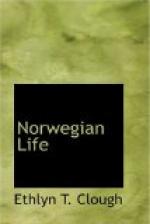The suffrage movement at first attracted little attention, but public sentiment grew slowly, and in 1890 Miss Krog succeeded in having a bill brought into the storthing giving women the right to vote in school matters. It received forty-four out of a total of one hundred and fourteen votes. The liberal party then made it an issue, and two years after the same bill received a majority in the storthing, but required two-thirds of the votes to pass. At that time a property qualification was required of men. The income tax returns were used as registration lists at the polls, and none but those who paid on incomes of $84 in the country and $92 in the city were allowed to vote.
The leaders of the movement for universal suffrage for men united forces with the women suffragists, and in 1898 accomplished their purpose. The women might have succeeded the same year but for an unfortunate division in their ranks. One faction wanted to limit suffrage to unmarried women who own property and deprive married women and dependent daughters and wage-earners of the ballot. But a compromise was finally arranged, the two factions were brought together, and in May, 1901, succeeded in accomplishing the purpose for which they have been engaged. They received the support of a large portion of the conservative members of the storthing as well as the unanimous support of the liberal and radical parties, only twenty votes being cast in the negative.
The women of Norway do not propose to rest on their present success. Miss Krog is continuing the fight to secure the right of participation in national as well as municipal affairs, and believes that the women will have all the political rights of men in Norway within the next few years. She insists that public sentiment favors the cause and that parliament will take a step further soon and amend the law by making it broader and more general. Universities are open to women on an equal basis with men, and many women are taking advantage of the opportunity to secure the higher education, and if ever, like the women of Finland, they are allowed to sit in parliament, they will be amply fitted to do so.
Under the present law only women who pay a certain amount of taxes can vote. An unmarried woman living at home is deprived of the ballot unless she has an income of her own; a married woman can not vote unless either she or her husband has a stated income. Thus many of the most intelligent and progressive women of the country are still outside the suffrage line. Everybody in Norway who earns a dollar pays an income tax. It may be very small, but a certain percentage of each day’s wages of every peasant goes into the government treasury. Every person in Norway declares that it is the least objectionable means of raising money for national and municipal expenses that has ever been tried there, and that it stimulates the patriotism of the people, who realize that they are contributors to the support of their government, and should take an active interest in its management.




